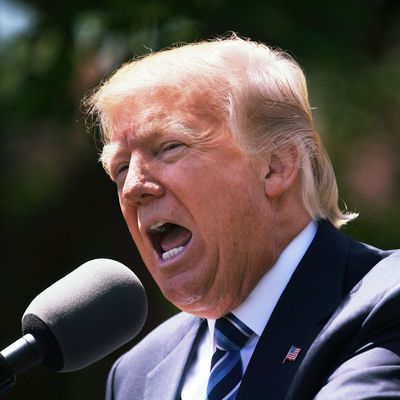
Just over a week ago, Donald Trump was in the Rose Garden celebrating the passage of his heinous health-care bill — and euphorically asking if anyone could believe that he was actually the president.
Now, his White House is engulfed in the smoke of fires he mindlessly started. This week, the president decided that the best way to prevent the media from obsessing about the investigation into his ties to Russia would be to:
1. Fire the man tasked with leading that investigation.
2. Have everyone in the White House insist for days that said investigation had nothing to do with the firing, which had actually been initiated by the Justice Department, not the president.
3. Then tell NBC News that actually he alone decided to fire the FBI director, and that he did so, in part, because the bureau’s investigation into his campaign is illegitimate — a statement that arguably amounts to a confession of obstruction of justice.
This proved to be a poor public-relations strategy.
And so, when the president woke up Friday morning, he knew there was only one way to put out the inferno he’d created: He was going to have to post some tweets.
Trump began with the classics.
Then, he advanced a pair of novel arguments.
(Thank God, “ability to multitask without creating constant public-relations nightmares” isn’t an essential skill for American presidents.)
(The president may abolish press briefings to improve transparency.)
The crazy thing (or, rather, a crazy thing) about these tweets is that Trump didn’t just contradict the verbal statements of his surrogates in his interview with NBC News — he contradicted his own written explanation of the Comey firing.
In his letter to the FBI director, Trump suggested that he had merely rubber-stamped a decision made by the Justice Department, writing, “I have received the attached letters from the Attorney General and Deputy Attorney General of the United States recommending your dismissal as the Director of the Federal Bureau of Investigation, I have accepted their recommendation.”
And then, the president tired of gaslighting and proceeded to straight-up blackmail.
On Thursday night, associates of James Comey told the New York Times that Trump had demanded the FBI director pledge loyalty to him at a private dinner. The meal came seven days into his presidency, and one day after Sally Yates warned the administration about Michael Flynn’s illicit conversation about sanctions with the Russian ambassador. Comey refused to take Trump’s loyalty oath.
Or so Comey’s associates say.
Surely, their narrative should be taken with grain of salt. After all, is there any reason to believe that the president would comport himself like an amateur authoritarian? It’s not like he just publicly tried to intimidate his former FBI director into silence by threatening to release secret recordings of their conversations — right?






























